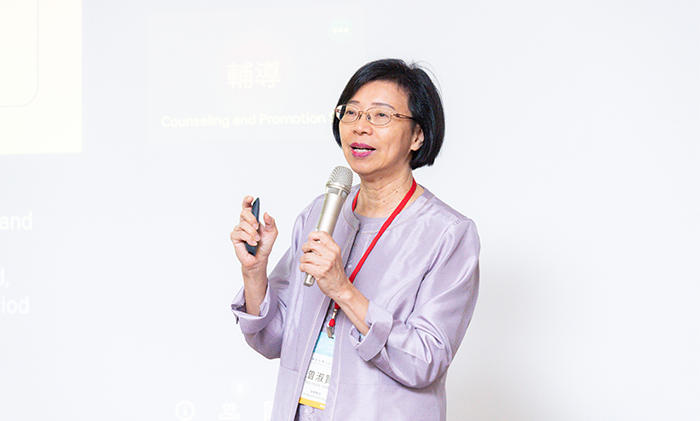The epidemic has prompted libraries to accelerate their adaptation to digitization and respond flexibly to new challenges. At the same time, it has also revealed the vulnerability of resource allocation, such as crowd control, limitation of use of venues, and shortage of librarians' manpower, etc. How to effectively reorganize the existing resources and feed them back into the library services has become a troubling issue.
Changes and challenges in service models
Professor Emeritus Shu Sien Tseng of Fo Guang University(FGU) presented the topic of "The Impact of COVID-19 on Libraries and the Digital Transformation of Taiwan Public Libraries", which centered on three key points.

Firstly, she discussed the impact of the epidemic on Taiwan public libraries; secondly, he introduced how Taiwan public libraries rapidly realized digital transformation during the epidemic; and finally, she shared the current status and goals of the "Building a Cooperative and Shared Public Library System Project".
The challenge of COVID-19 to library management decision-making and leadership should not be underestimated. Shu Sien Tseng illustrated that, according to an analysis of US literature, library leaders and librarians were ill-prepared for crisis management, and poorly programmed to work remotely, which prevented a smooth transition of library services during the outbreak and made the value of libraries questionable. How to provide services online and safeguard the well-being of librarians became a major challenge.
Furthermore, the complexity of the decision-making process on whether libraries should be open or not had far-reaching implications for library operations and management and emphasized the importance of flexible and efficient management decisions.
Epidemic accelerates digital transformation of libraries

In terms of how public libraries could quickly realize digital transformation during the epidemic, Shu Sien Tseng believes that we can learn from the digital transformation strategy of the National Library of the Czech Republic. They passed an amendment to the copyright law to allow libraries to provide free access to previously published books and journals on the Internet. They also provided free digital library services to university students, teachers and researchers, and introduced the service of "verification through bank identification", which greatly enhanced the convenience of library services.
The effectiveness of the "Building a Cooperative and Shared Public Library System Program" in Taiwan is multi-faceted, including enhancing the operational efficiency of municipal public libraries, drawing the attention of county and city leaders to library operations, and strengthening the leadership of county and municipal public libraries. The program also links township libraries to enhance overall operational efficiency and to establish an identity for county and municipal public libraries.
Through the sharing of resources, we not only save operating costs, but also enhance our competitiveness. At the same time, the establishment of standardized operational procedures ensures consistency in service delivery. Emphasis is also placed on the professional development of librarians and the establishment of a quality management follow-up assessment system to enhance service quality. In addition, the development of specialized thematic libraries can further deepen the services provided by public libraries.
Continuing to innovate technology and upgrade library services

It is impossible to predict the future of public libraries, but Shu Sien Tseng believes that "we can create it through positive efforts," and that strengthening leadership skills, promoting digital transformation, and enhancing influence are of paramount importance. Libraries are not only advocates of reading, but also enhance the public's intellectual competitiveness and play the role of knowledge centers. Digital transformation is the necessary and best way to do this, because only through continuous improvement can libraries realize their unlimited potential.